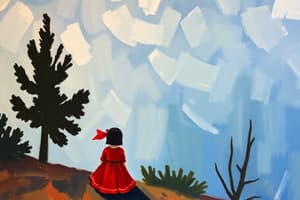Podcast
Questions and Answers
What percentage of your total grade does the exam contribute to?
What percentage of your total grade does the exam contribute to?
30%
How many extended answer questions will there be on the exam?
How many extended answer questions will there be on the exam?
4
Which themes are included in the exam? (Select all that apply)
Which themes are included in the exam? (Select all that apply)
- Mathematical theories
- Planning processes and considerations in Early Childhood (correct)
- Child led pedagogies and associated documentation (correct)
- Reflection and evaluation (correct)
What is one approach to curriculum mentioned in the document?
What is one approach to curriculum mentioned in the document?
What is the emphasis of the Montessori method?
What is the emphasis of the Montessori method?
Wall stories are a way in which educators can record children's learning, and they provide opportunities for both children and ______ to see learning documented.
Wall stories are a way in which educators can record children's learning, and they provide opportunities for both children and ______ to see learning documented.
Reflection in action is a component of reflective practice.
Reflection in action is a component of reflective practice.
What is a key benefit of reflective practice for educators?
What is a key benefit of reflective practice for educators?
Which of the following is not a strategy for recording children's learning?
Which of the following is not a strategy for recording children's learning?
What does 'Holistic approaches to assessment' imply?
What does 'Holistic approaches to assessment' imply?
Flashcards are hidden until you start studying
Study Notes
Exam Overview
- The EDUC2001 exam is worth 30% of the total grade.
- It consists of 4 extended answer questions, each requiring approximately 2 pages.
Themes
- Planning processes and considerations in Early Childhood
- Theoretical/philosophical approaches to curriculum
- Child led pedagogies and associated documentation
- Reflection and evaluation
Question 1: Planning in Early Childhood
- This question examines the planning process in Early Childhood.
- It emphasizes the importance of considering relevant policy and curriculum frameworks.
- The question is worth 10 marks.
Sub-Themes of Question 1
- System Directives: Planning should align with system-level directives.
- School Directives: Incorporate school-specific directives and plans.
- Classroom Planning: Focus on practical classroom-level planning.
- Starting Point: Refer to Kindy Guidelines as a starting point.
- Observation and Assessment: Use observation and assessment to inform planning.
- Curriculum Frameworks: Integrate the Australian Curriculum and SCASA frameworks.
- Holistic Approaches: Prioritize holistic approaches to assessment.
Question 2
- This question requires knowledge of different curriculum approaches.
- Students must choose two out of five approaches and discuss them in detail.
- Each chosen approach is worth 8 marks.
Curriculum Approaches
-
1. Reggio Emilia Approach*
-
Child-Centered Learning
-
Emergent Curriculum
-
Project-Based Learning
-
Collaborative Learning
-
Documentation
-
Teachers as Co-Learners
-
Multiple Forms of Expression (100 languages of the child)
-
Environment as “Third Teacher”
-
Reggio-Inspired Materials
-
Respect for Children's Voices
-
Parent and Community Involvement
-
Reflection and Professional Development
-
Holistic Development
-
Image of the Child
-
2. Anti-Bias Curriculum*
-
Awareness of Bias
-
Inclusive and Diverse Representation
-
Critical Thinking
-
Empathy and Perspective-Taking
-
Identity Exploration
-
Social Justice Education
-
Culturally Responsive Teaching
-
Positive Role Models
-
3. Montessori Approach*
-
Child-Centered Learning
-
Prepared Environment
-
Freedom and Responsibility
-
Mixed-Age Groups
-
Individualized Learning
-
Hands-On Learning
-
Self-Directed Learning
-
Respect for the Child
-
Observation and Documentation
-
Parent Involvement
-
The Role of the Teacher
-
4. Steiner Approach*
-
Education for the Whole Child
-
Age-Appropriate Learning
-
Artistic Expression
-
Emphasis on Imagination and Creativity
-
No Early Academics
-
Non-Competitive Environment
-
Integrated Learning
-
Strong Teacher-Student Relationships
-
Ethical and Social Development
-
A Connection to Nature
-
Parental Involvement
-
5. Inquiry/Project Approach*
-
This approach is explored further through the work of Kathy Murdoch and Kathy Walker.
-
Kathy Walker Learning is an Australian adaptation emphasizing the integration of inquiry and play-based learning.
-
6. Play-Based Approach*
-
It is the intentionality of the educator that differentiates effective play-based learning from a laissez-faire approach.
-
Intentional, child-centered, open-ended, scaffolded and value-added by educators.
Question 3: Pedagogical Documentation
- This question centers on recording, assessing and reporting strategies.
- Students need to demonstrate knowledge of a range of pedagogic documentation methods.
- The question is worth 6 marks.
Pedagogical Documentation Methods
- Processes: Educators document learning through methods like: Wall stories, Classroom diaries, Floor Books.
- Products: Documentation may involve portfolios, work samples, and reports.
Methods Explained:
- Wall Stories: Visual representations of learning, often with children's contributions, photographs, and links to curriculum outcomes.
- Classroom Diaries: Records of learning experiences, encouraging reflection and capturing incidental learning.
- Floor Books (Claire Warden): Records of children's voices and ideas, used for guided planning and documenting the process of learning.
- Other recording and assessment methods: Portfolios, Reports, Work Samples.
Question 4: Reflection and Evaluation
- This question examines the significance of reflection in teaching practice.
- Students need to understand the importance of reflection and the process involved.
- The question is worth 6 marks.
The Importance of Reflection
- Reflective practice helps educators respond thoughtfully and with integrity to complex situations and challenges.
- It allows for careful and well-informed decisions and plans.
- It facilitates the implementation and evaluation of changes in practices and policies.
- It ensures accountability to families, colleagues, and communities for chosen approaches and methods.
- Improves learning experiences and outcomes for children.
Reflection within the Teaching Cycle
- Reflection in action: Occurs during the act of teaching.
- Reflection on action: Occurs after a teaching episode.
- Reflection for action: Informs future teaching practices.
Reflection Levels
- School/Center: Reflection at an institutional level.
- Classroom: Reflection by individual teachers within their classrooms.
- Self: Personal reflection by educators on their own practices.
Studying That Suits You
Use AI to generate personalized quizzes and flashcards to suit your learning preferences.




